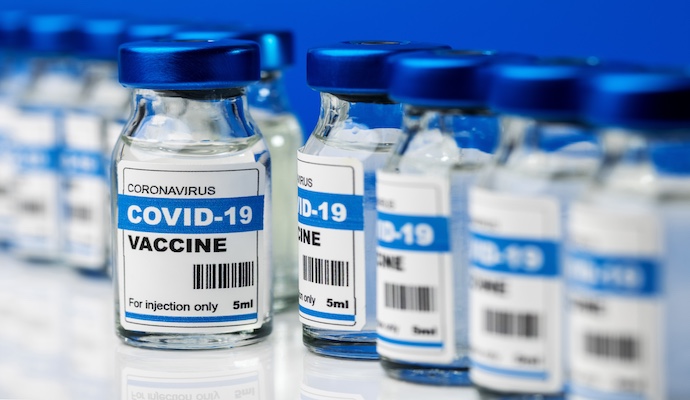10 Things to Know About the Updated 2023 COVID-19 Vaccines
Public awareness of the updated COVID-19, RSV, and flu vaccines is vital for informed decisions and protection against new strains.

Source: Adobe Stock
- With the onset of the fall season, many Americans are grappling with numerous questions about COVID-19 booster shots, the flu vaccine, and respiratory syncytial virus (RSV) protection. This year's vaccine rollout has encountered hiccups, causing concerns about accessibility and insurance coverage. To shed light on these issues, Katelyn Jetelina, MPH, PhD, an epidemiologist from the University of Texas, recently discussed the state of vaccine distribution and offered guidance for navigating the complex vaccine landscape in 2023 with PBSNewsHour.
1. What Led to Issues in the 2023 COVID-19 Booster Rollout?
The COVID-19 booster rollout has been less smooth than earlier rollouts during the pandemic due to a significant shift from government-run to commercial vaccine distribution. Jetelina emphasized this change, explaining that the United States government is no longer responsible for procuring and distributing vaccines. This shift has introduced multiple payers, such as insurance companies, leading to a slower, fragmented, and less equitable system.
2. Are COVID-19 Vaccines Covered by Insurance?
Addressing concerns about insurance coverage, Jetelina clarified that no one should pay for a COVID-19 vaccine. Private insurance companies are mandated to cover it with no copay. However, they are no longer required to cover out-of-pocket costs, which may necessitate doctor's office visits for vaccination. Federal law mandates that CVS and Walgreens provide free vaccines through a new federal bridge program for uninsured individuals.
The CDC's Bridge Access Program allows free COVID-19 vaccines to uninsured adults and those whose insurance does not fully cover vaccine expenses until December 31, 2024. While most insured adults can get the updated vaccines free, approximately 25–30 million uninsured adults and individuals with inadequate coverage can access vaccines through this program. Vaccines are available for adults aged 18 and above at healthcare provider offices, federally supported health centers, and participating retail pharmacies. To discover locations providing free COVID-19 vaccines through the Bridge Access Program, visit vaccines.gov; availability is anticipated to improve soon.
3. Who Will Get the Updated COVID-19 Booster?
A KFF poll found that only 46% of US adults plan to get the updated COVID-19 vaccine booster. This percentage, though lower than the initial vaccine rollout, is considered positive by Jetelina, as it aligns with typical pre-pandemic and pandemic flu vaccine acceptance rates.
4. Can People Get Multiple Vaccines at Once?
Many wonder when and how to receive vaccines available this fall, including COVID-19, seasonal flu, and RSV vaccines. Jetelina provided the following guidance.
- COVID-19: Available for everyone over 6 months old; it can be administered alongside flu or RSV vaccines, depending on individual risk factors and timing.
- RSV: Available for those over 60 and recommended for pregnant individuals during their last trimester to safeguard newborns. Monoclonal antibodies are available for children under 8 months old during their first RSV season.
- Seasonal flu: Open to those aged 6 months and older. While its protection lasts longer than COVID-19, older adults should consider vaccination in October.
Jetelina's overarching recommendation is to receive all three vaccines (flu, COVID-19, and RSV) before Halloween (October 31) to maximize winter protection.
5. What Is New About the 2023 COVID-19 Vaccines?
Newly updated (2023–2024 formula) mRNA COVID vaccines promise improved protection against severe disease, hospitalization, and death from COVID-19. These vaccines are now available to everyone 6 months and older, a shift from the earlier booster strategy targeting those aged 60 and older.
6. When Were Pfizer–BioNTech and Moderna Vaccines Updated?
On September 11, 2023, the US Food and Drug Administration (FDA) approved and granted emergency use authorization (EUA) for enhanced COVID-19 vaccines by Moderna and Pfizer. These vaccines, tailored to current variants, offer improved protection against severe outcomes like hospitalization and death.
7. Which COVID Variants Do the Vaccines Protect Against?
The updated vaccines target the Omicron variant XBB.1.5, a subvariant of Omicron that was dominant in the US until recently. The CDC assures that these vaccines should also be effective against current SARS-CoV-2 variants, including EG.5 and BA.2.86, which have multiple spike protein mutations.
8. Are COVID-19 Vaccines Safe?
According to the CDC, the benefits of COVID-19 vaccination outweigh the potential risks, and serious reactions are rare. Studies indicate that the risk of cardiac complications, including myocarditis, in males aged 12–17 years old is 1.8–5.6 times higher after a COVID-19 infection than after vaccination.
9. What Are the 2023 COVID-19 Vaccine Recommendations for Children?
The FDA has approved the updated mRNA vaccines for adolescents and teenagers aged 12 and older and authorized them for emergency use in children from 6 months to 11 years old. While children are less likely to experience severe illness from COVID-19, vaccination is recommended, especially for immunocompromised individuals.
10. What Is the Novavax Vaccine?
On October 3, 2023, the FDA announced an EUA of an updated Novavax vaccine targeting the XBB.1.5 strain. Those aged 12 and older who have not received an updated mRNA COVID-19 vaccine are eligible for one dose, while unvaccinated individuals can receive two doses. Using a traditional protein-based approach, this vaccine is an alternative to mRNA vaccines and is the only non-mRNA COVID-19 vaccine available in the US.
Staying informed about the 2023 COVID-19, RSV, and flu vaccines is crucial for protecting against new strains and achieving widespread immunity. Public awareness and proactive vaccination can pave the way for a healthier and safer future.
To learn more about these vaccines and their availability, consult a healthcare provider and visit official resources like vaccines.gov for up-to-date information.
